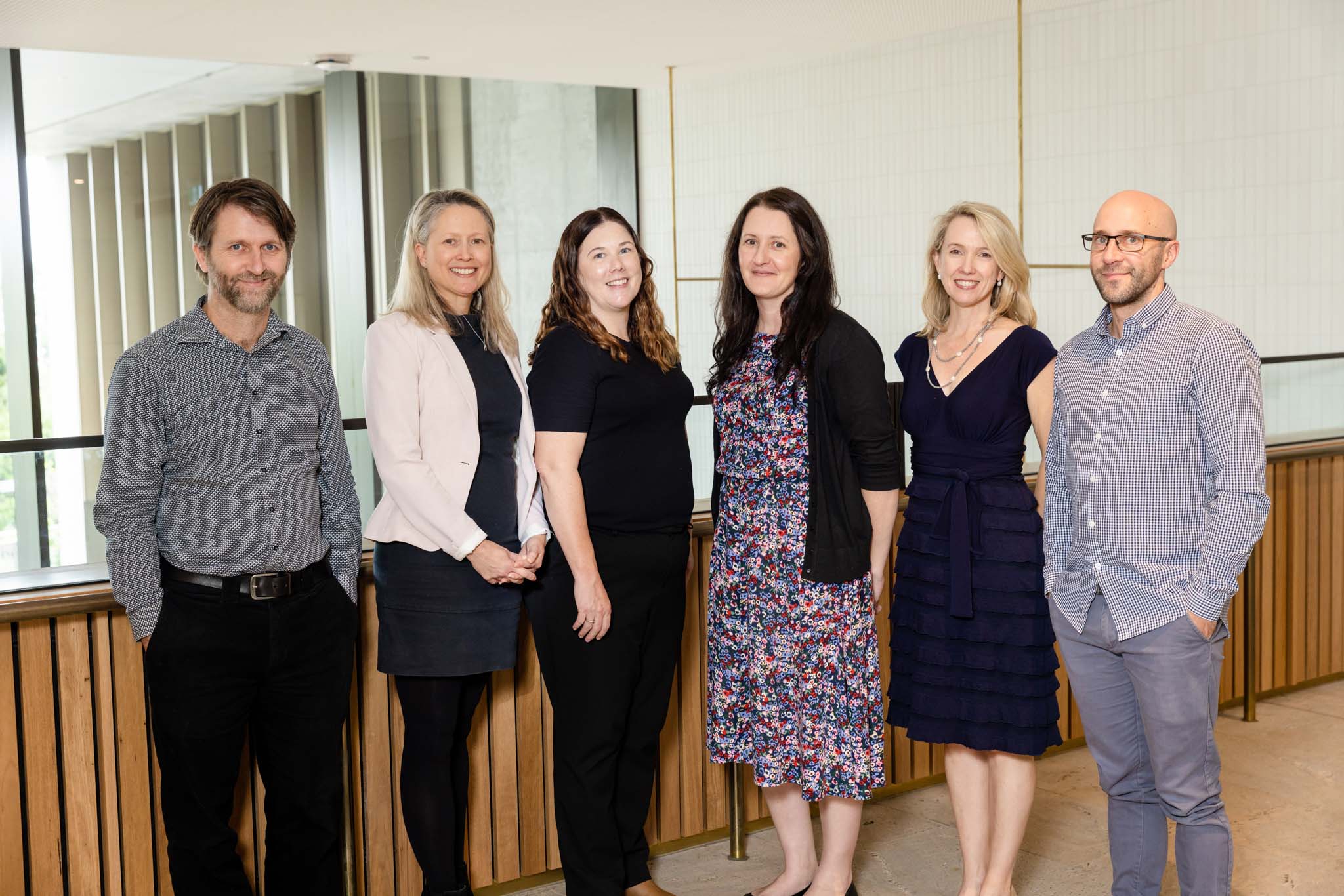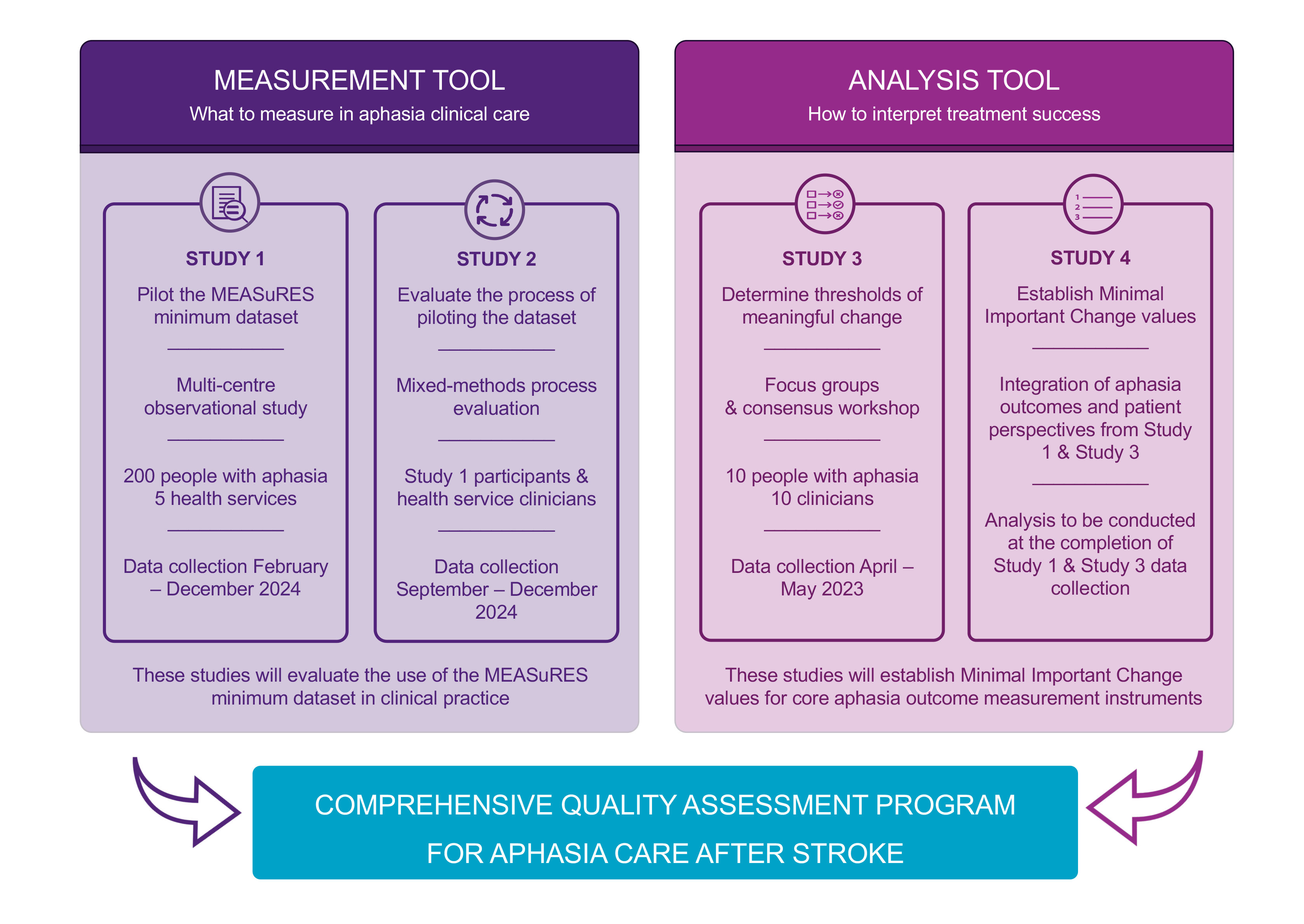Queensland Aphasia Research Centre (QARC)
Optimising the lives of people with Aphasia
MEASuRES: Driving quality improvement through Meaningful Evaluation of Aphasia SeRvicES
Measuring and monitoring aphasia services.
Progress
The MEASuRES project is currently underway.
About the MEASuRES project
The MEASuRES project aims to establish routine measurement of important information about:
Who people with aphasia are
the quality of care people with aphasia receive in hospital
the aphasia treatments people with aphasia receive in hospital
the language, communication, emotional wellbeing and quality of life outcomes before and after treatment
This information makes up the minimum aphasia dataset.
The MEASuRES project comprises four main studies:
(Click the image to see a full-sized version.)
Study 1 will pilot the collection of the minimum aphasia dataset in Australia hospitals.
Study 2 will evaluate patient and staff experiences of collecting the minimum aphasia dataset.
Study 3 will establish thresholds of meaningful change in language, communication, emotional wellbeing and quality of life outcomes. How much change does a person with aphasia need to experience to consider it a meaningful change?
Study 4 will establish Minimal Important Change values for common aphasia tests.
These studies will deliver a comprehensive quality assessment program for aphasia care after stroke.
Progress to date
11 Quality Indicators for Post-stroke aphasia services have been identified.
These indicators are based on the outcomes of the study “Establishing Quality Indicators and Implementation Priorities for Post-Stroke Aphasia Services Through End User Involvement”.
Access an infographic summarises the indicators. (JPG, 496.3 KB)
Understanding important changes in aphasia recovery.
Speech pathologist Sally Zingelman and colleagues have completed a project to better understand important changes in aphasia recovery.
Read more about the study including outcomes and practical advice, in a brochure co-designed with people with lived experience of aphasia.
How to be involved
We are looking for people to be involved in this study. We are looking for people:
- who have aphasia after a stroke less then one year ago
- living in Australia
- who have access to the internet and their own device for online meetings.
Brisbane and Sunshine Coast residents: there will be an option for in-home visits.
You will be asked to:
- join 3 online meetings (total: 6 hours)
- complete aphasia tests and rate your change.
You will:
- receive a report with your test results
- be reimbursed for your time (up to $300).
To learn more or register your interest in the study, click the button below:
Media and Awards
Funding and acknowledgments
This project is funded by:
A National Health and Medical Research Council Investigator Grant (91175821)
A Medical Research Futures Fund Cardiovascular Health Grant Opportunity (MRF2016134)
Australian Government Research Training Program scholarships
Partner organisations
The Centre for Research Excellence in Aphasia Recovery and Rehabilitation
The Stroke Foundation
Australian Aphasia Association
Research publications
Stone, M., Wallace, S.J., Copland, D.A., Cadilhac, D.A., Hill, K., Purvis, T., Reyneke, M., & Kilkenny, M.F. (2025).
Quality and outcomes of acute stroke care for people with and without aphasia.
Archives of Physical Medicine and Rehabilitation, Epub ahead of print. PMID: 40685004.
https://doi:10.1016/j.apmr.2025.07.007
Zingelman, S., Wallace, S.J., Kim, J., Harvey, S., Rose, M.L, C, Bagot, K.L., Pierce, J.E. & Cadilhac, D.A. (2025).
Aphasia-Specific or Generic Outcomes? A comparison of two health-related quality of life instruments for economic evaluations of aphasia treatments.
Quality of Life Research,
https://doi.org/10.1007/s11136-025-04040-8
Zingelman, S., Wallace, S. J., Kim, J., Mosalski, S., Faux, S. G., Cadilhac, D. A., Alexander, T., Lannin, N. A., Olaiya, M. T., Clifton, R., Shiner, C. T., Starr, S., & Kilkenny, M. F. (2024).
Is communication key in stroke rehabilitation and recovery? National linked stroke data study.
Topics in Stroke Rehabilitation, 31(4), 325-335.
https://doi.org/10.1080/10749357.2023.2279804
An updated systematic review of stroke clinical practice guidelines to inform aphasia management
International Journal of Stroke
https://journals.sagepub.com/doi/full/10.1177/17474930231161454
Shrubsole, Kirstine, Stone, Marissa, Cadilhac, Dominique A., Kilkenny, Monique F., Power, Emma, Lynch, Elizabeth, Pierce, John E., Copland, David A., Godecke, Erin, Burton, Bridget, Brogan, Emily, and Wallace, Sarah J. (2024).
Establishing quality indicators and implementation priorities for post-stroke aphasia services through end-user involvement.
Health Expectations 27 (5) e14173 1-18.
https://doi.org/10.1111/hex.14173
Zingelman, Sally, Cadilhac, Dominique A., Kim, Joosup, Stone, Marissa, Harvey, Sam, Unsworth, Carolyn, O'Halloran, Robyn, Hersh, Deborah, Mainstone, Kathryn, and Wallace, Sarah J. (2024).
'A meaningful difference, but not ultimately the difference i would want': a mixed-methods approach to explore and benchmark clinically meaningful changes in aphasia recovery.
Health Expectations 27 (4) e14169 1-12.
https://doi.org/10.1111/hex.14169
Harvey, Sam, Stone, Marissa, Zingelman, Sally, Copland, David A, Kilkenny, Monique F, Godecke, Erin, Cadilhac, Dominique A, Kim, Joosup, Olaiya, Muideen T, Rose, Miranda L, Breitenstein, Caterina, Shrubsole, Kirstine, O'Halloran, Robyn, Hill, Annie J, Hersh, Deborah, Mainstone, Kathryn, Mainstone, Penelope, Unsworth, Carolyn A, Brogan, Emily, Short, Kylie J, Burns, Clare L, Baker, Caroline, and Wallace, Sarah J (2024).
Comprehensive quality assessment for aphasia rehabilitation after stroke: protocol for a multicentre, mixed-methods study.
BMJ Open 14 (3) e080532 e080532.
Research team
The MEASuRES project involves people with lived experience of aphasia, family members, clinicians and researchers from around Australia.

Sally Zingelman, Sarah Wallace, Annie Hill and Sam Harvey.
Project lead
- Associate Professor Sarah Wallace
Research team
- Professor David Copland
Professor Dominique Cadilhac
Professor Erin Godecke
Professor Deborah Hersh
Professor Miranda Rose
Professor Carolyn Unsworth
Associate Professor Monique Kilkenny
Associate Professor Robyn O’Halloran
Dr Sam Harvey
Dr Emily Brogan
Dr Kirstine Shrubsole
Dr Muideen Olayia
Dr Joosup Kim
Dr Annie Hill
Dr Caroline Baker
Dr Rochelle Pitt
Dr Caterina Breitenstein
Catherine Burns
Dr Sally Zingelman
PhD students
Marissa Stone
Consumer advisory group
Melle Stewart
Ben Lewis
Mary Yutziss
Kathryn Mainstone
Rukmani Rusch
Naomi Burns

